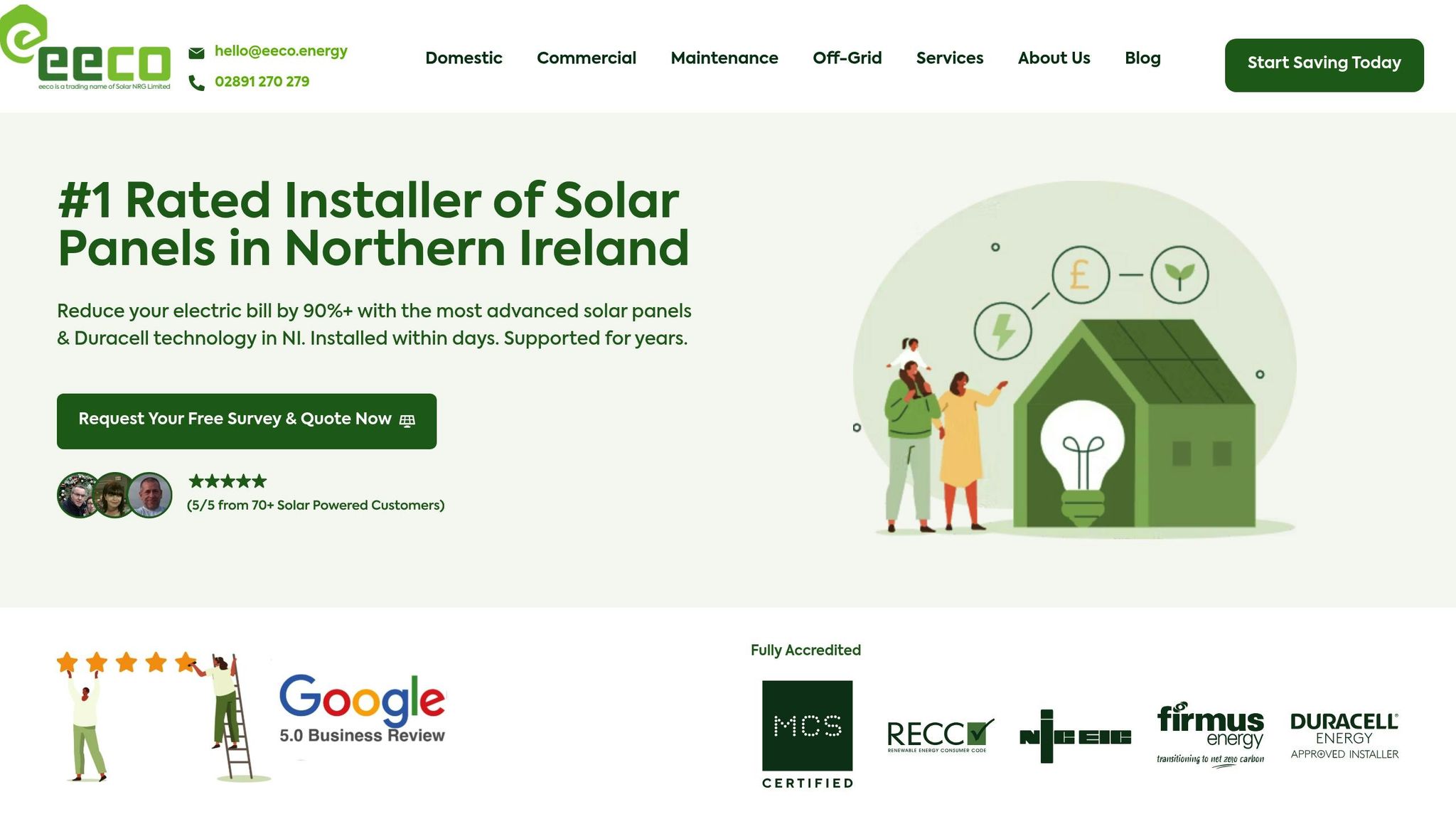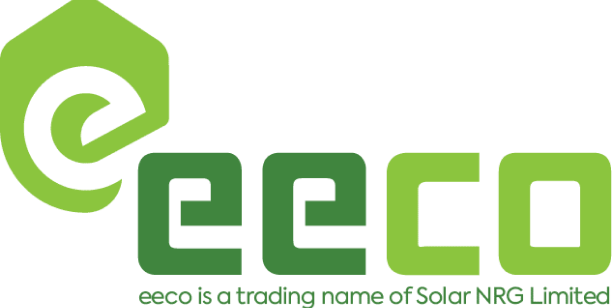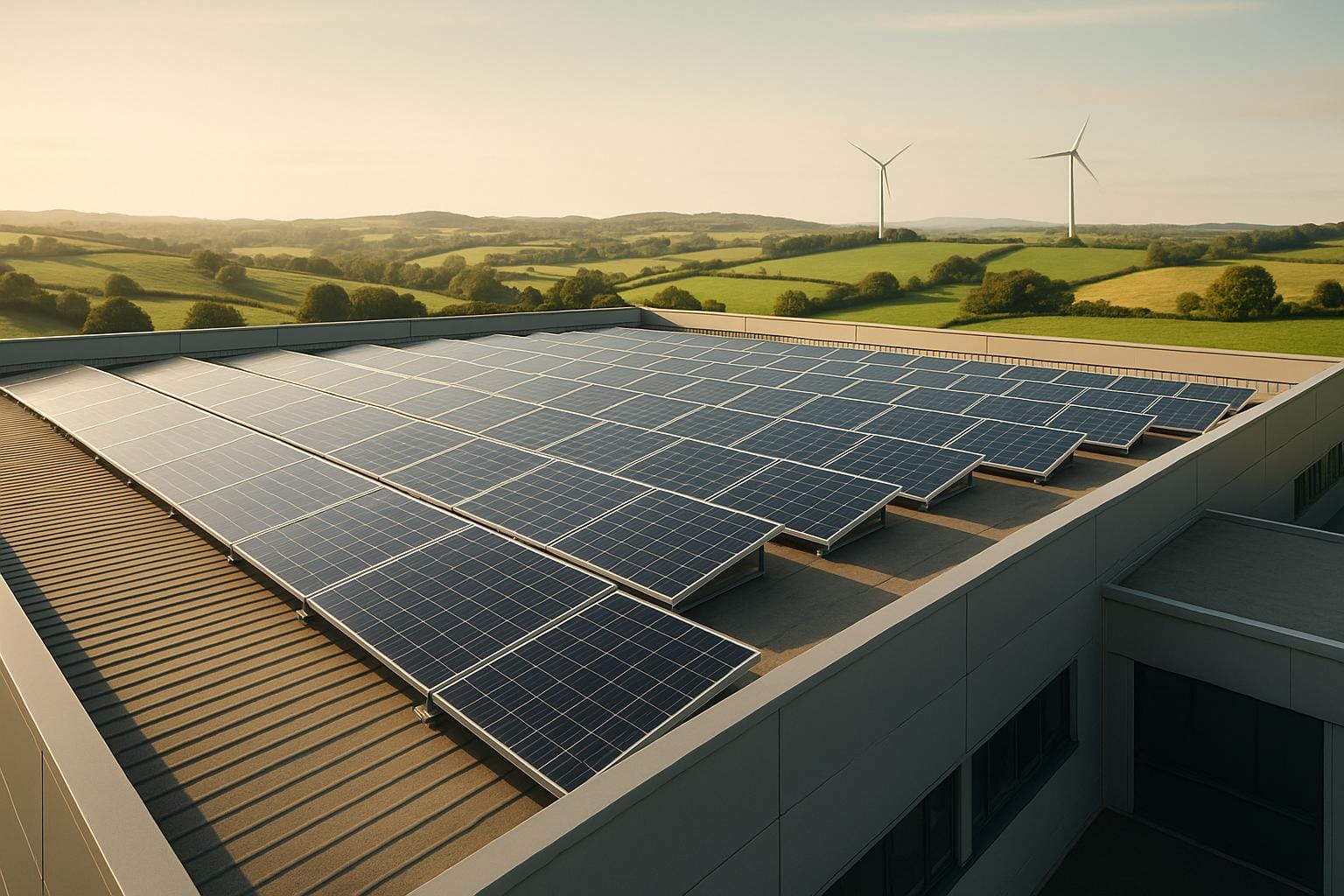Looking to cut energy costs for your business in Northern Ireland? 2025 offers several funding options to make solar power more affordable. From grants to tax breaks, businesses of all sizes can reduce upfront costs and enjoy long-term savings. Here’s what you need to know:
- Key Grants: The Northern Ireland Sustainable Energy Programme (NISEP) provides up to 20% funding from an £8 million budget until March 2027. Energy-intensive industries can apply for the Industrial Energy Transformation Fund (IETF).
- Tax Benefits: Zero-rated VAT, capital allowances, and business rates relief help reduce costs. Full Expensing tax relief allows 100% deductions on qualifying expenses until March 2026.
- Eligibility: Businesses must be registered in Northern Ireland, with properties suitable for solar installation. Special programmes are available for sectors like agriculture, education, and healthcare.
- Application Tips: Submit proposals before starting work to qualify. Partner with MCS-certified installers for grant compliance and quality assurance.
With rising energy costs and quick payback periods (under three years), now is the time to invest in solar. Partnering with trusted installers like EECO Energy ensures smooth project execution and access to incentives.
Grant Programmes and Incentives for 2025
Businesses in Northern Ireland have access to funding opportunities designed to make renewable energy projects more affordable and practical. These programmes combine grants, tax breaks, and regulatory benefits to help reduce upfront expenses and enhance the financial feasibility of such initiatives.
Main Grant Programmes for 2025
The government offers schemes to support renewable energy installations for qualifying businesses. Additional programmes are available to assist small and medium-sized enterprises in cutting their carbon emissions. There’s also tailored support aimed at sectors like manufacturing, rural businesses, and education, encouraging the adoption of sustainable energy practices. These grants are further complemented by tax reliefs, making initial investments more manageable.
Tax Incentives and Financial Benefits
Solar energy projects enjoy several financial perks, including zero-rated VAT, capital allowances, and business rates relief for buildings equipped with renewable energy systems. These measures significantly cut project costs and contribute to long-term savings. In some cases, solar projects may also be exempt from certain environmental levies, adding to operational cost savings.
Who Can Apply for Grants
Funding is available to a wide range of organisations, including private companies, partnerships, large enterprises, and specific public and community groups, provided they meet the eligibility requirements. Specialised programmes are also in place for agricultural businesses, schools, healthcare providers, community organisations, and public sector bodies. This broad approach reflects a strong commitment to advancing renewable energy and sustainability goals in 2025.
How to Apply for Solar Grants
Securing commercial solar grants involves meeting eligibility criteria and following the application process carefully. Ensuring your business meets the necessary requirements is the first step towards a successful application. Here’s a breakdown of what you need to know.
Eligibility Requirements
For 2025, the Northern Ireland Sustainable Energy Programme (NISEP) is the main commercial solar grant available. To qualify, your business must be registered in Northern Ireland, and the property in question must be suitable for solar panel installation.
If your business operates in an energy-intensive industry, the Industrial Energy Transformation Fund (IETF) might be a better fit. This programme supports projects that go beyond standard solar installations, focusing on significantly reducing carbon emissions in industrial processes.
It’s worth noting that the Energy Efficiency Capital Grant (EECG), provided by Invest NI, has been on hold since April 2024. As a result, businesses are encouraged to prioritise applications to NISEP and IETF.
Application Steps
To get started, register through the relevant online portal and ensure your proposal is submitted before any work begins – retrospective claims are not allowed.
Your project proposal should clearly outline your solar installation plans and demonstrate how they align with the grant’s eligibility criteria. For IETF projects, it’s essential to highlight how the installation will contribute to reducing carbon emissions on a larger scale.
Planning Permission Requirements
Before moving forward, make sure to address any regulatory obligations. Whether planning permission is required will depend on factors like the size of the system, the property’s location, and its status (e.g., listed buildings or properties in conservation areas). Reaching out to your local planning authority early in the process is highly recommended to confirm whether permission is needed and to understand the timelines involved.
Partnering with an experienced solar installer familiar with local regulations can make this process smoother. They can help ensure all planning and compliance requirements are met without unnecessary delays.
Benefits of Commercial Solar Systems
Commercial solar systems bring a range of advantages that go beyond just cutting costs. They offer financial savings, help the environment, and even enhance business operations. Let’s break down how these benefits can make a real difference.
Cost Savings and Financial Returns
One of the most immediate perks of installing a commercial solar system is the reduction in electricity bills. By generating your own power, you can lower monthly energy costs and manage your operating expenses more efficiently. Plus, with relatively short payback periods, solar investments can quickly become profitable. Another bonus? Solar shields your business from unpredictable energy price hikes, giving you more stable and predictable costs. This means more cash on hand to invest in your core business activities.
Reducing Carbon Emissions
Switching to solar isn’t just good for your bottom line – it’s good for the planet too. Solar systems cut down on the need for traditional energy sources, which in turn reduces carbon emissions. This aligns your business with local climate goals and helps meet sustainability targets. If your company has environmental reporting requirements, solar energy can be a key part of demonstrating your commitment to cleaner energy.
Boosting Business and Property Value
Solar energy can also bring operational and property-related benefits. For one, it increases energy independence, which can be a lifesaver during power outages, ensuring that key operations keep running. On top of that, having solar panels can make your commercial property more attractive to tenants, especially those who value sustainability. It can even add to the long-term value of your property. Lastly, by adopting solar, you’re sending a clear message about your commitment to renewable energy. This can enhance your brand image and align with broader corporate social responsibility goals, which is a win-win for both your business and its reputation.
sbb-itb-d2d975a
Choosing an Approved Solar Installer
Picking the right installer is a key step in any commercial solar project. The installer you select doesn’t just handle the technical work – they ensure your system aligns with industry standards and meets grant eligibility requirements. This is why opting for an MCS-certified installer is so important. It guarantees both quality workmanship and compliance with necessary regulations.
Why Accreditation Matters
When applying for commercial solar grants in Northern Ireland, MCS certification is a must-have. Installers with this accreditation meet recognised industry standards, ensuring your solar system is efficient, safe, and reliable. Beyond that, MCS-certified professionals simplify the often-complicated grant process. Their expertise in handling the specific documentation and technical requirements can save you time and help avoid unnecessary headaches during your application.
EECO Energy: A Trusted Partner in Solar

EECO Energy sets the bar high when it comes to commercial solar solutions. As an MCS-certified installer with extensive experience in Northern Ireland, they understand the specific challenges businesses face when adopting solar energy. Their services go beyond solar panel installations, offering battery storage systems, EV charging stations, and full maintenance support. This all-in-one approach makes managing your renewable energy systems straightforward and hassle-free.
EECO Energy is also an approved installer of Duracell battery systems, providing a range of high-quality storage options to fit different budgets and performance needs. They offer free surveys and quotes, fast and efficient one-day installations for suitable properties, and a 25-year warranty for peace of mind. With their professional expertise, EECO Energy helps businesses across Northern Ireland transition to solar energy with confidence.
Summary
Commercial solar grants in Northern Ireland for 2025 present a strong opportunity for businesses looking to invest in renewable energy. The Northern Ireland Sustainable Energy Programme (NISEP) offers grants of up to 20% from an £8 million fund, which has been extended until March 2027. This extension provides businesses with a clear two-year window to apply and plan their projects.
The financial benefits of commercial solar are increasingly appealing. Current payback periods are under three years, making solar installations a highly profitable venture. On top of that, the 0% VAT rate on solar panels can save businesses approximately £1,000 and shorten payback periods by up to a year. Additionally, the Full Expensing tax relief allows for 100% deductions on qualifying expenses until March 2026, further strengthening the financial case for solar investments. These incentives make it clear that acting sooner rather than later is advantageous.
Recent updates confirm that the scheme is now open:
"The 25/26 grant scheme is now open for applications." – Power NI Business & Farm
To ensure eligibility, businesses should secure a grant offer letter from scheme managers, such as Power NI, before placing any orders. Beyond grants, the Smart Export Guarantee provides an ongoing revenue stream by enabling businesses to earn from excess electricity exported back to the grid.
Choosing MCS-certified installers is critical, and partnering with EECO Energy ensures both compliance and quality. EECO Energy offers a seamless process, handling everything from initial surveys to providing a 25-year warranty. Their expertise in Duracell battery systems and their proven success across Northern Ireland make them a reliable partner for commercial solar projects. This comprehensive approach not only simplifies the adoption of solar energy but also maximises the available incentives.
With generous grants, tax benefits, and quick payback periods, 2025 is shaping up to be a prime year for businesses in Northern Ireland to make the switch to commercial solar energy.
FAQs
How can my business qualify for the NISEP grant in Northern Ireland in 2025?
To qualify for the Northern Ireland Sustainable Energy Programme (NISEP) grant in 2025, your business must operate in Northern Ireland and meet certain conditions. These include owning the property, adhering to income limits (for example, a household income under £28,000 for a single income or £40,000 for a total household income), and showing a need for energy efficiency improvements, such as having a BER rating of B3 or lower prior to upgrades.
Additionally, you must work with approved contractors for any installations or upgrades and submit all necessary documentation during the application process. This ensures your application aligns with the programme’s requirements.
Why should I choose an MCS-certified installer like EECO Energy for my commercial solar project?
Choosing an MCS-certified installer like EECO Energy means your solar project will meet the highest standards for quality, safety, and performance. This certification ensures that your solar system is installed to work efficiently and reliably, offering you confidence and long-term value.
On top of that, opting for an MCS-certified installer is often essential if you want to access government-backed schemes like the Smart Export Guarantee (SEG). These programmes can help reduce your energy costs, making your investment even more worthwhile. With EECO Energy’s deep knowledge of solar solutions, you can trust that your project will be handled smoothly and deliver the best possible results.
What financial advantages can businesses gain from installing commercial solar systems in Northern Ireland in 2025?
Investing in commercial solar systems in Northern Ireland in 2025 brings notable financial advantages. Businesses can significantly cut energy expenses, with many solar setups seeing a payback period of just 3 to 5 years. Since solar panels generally last over 25 years, they offer long-term savings and a dependable return on investment.
Government support, like the grants available through the Northern Ireland Sustainable Energy Programme, can cover up to 20% of installation costs, making it easier for businesses to take the leap. On top of that, the ongoing drop in solar technology costs means systems are more affordable than ever, with prices in 2025 averaging £2.60 per watt.
Switching to solar energy doesn’t just lower operational expenses. It also helps businesses play their part in building a cleaner future by cutting carbon emissions and boosting local employment in the renewable energy industry.


